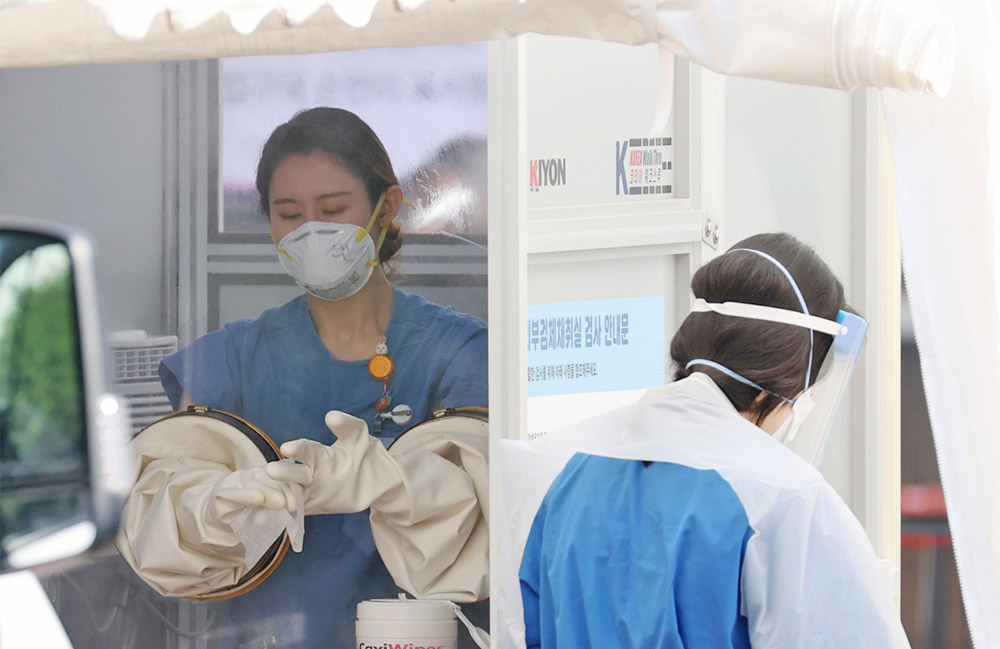The number of daily new coronavirus cases in South Korea stayed below 300 for the second consecutive day Tuesday, but church-linked cases continued to build up, with a growing number of patients with unknown infection routes also straining the country’s virus fight.
The country reported 280 new COVID-19 cases, including 264 local infections, raising the total caseload to 17,945, according to the Korea Centers for Disease Control and Prevention (KCDC).
Tuesday’s daily tally marks a slight increase from 266 cases identified the previous day. South Korea reported 324 new cases on Friday, followed by 332 and 397 infections on Saturday and Sunday, respectively.
The country reported 103 new cases on Aug. 14, which nearly doubled from the previous day. Since then, the country’s daily virus cases have been in triple digits, as sporadic clusters have emerged, mostly traced to a church in northern Seoul and an anti-government march on Liberation Day on Aug. 15.
Over the past 12 days, a whopping 3,175 new cases across the nation were identified. Of the locally transmitted cases, Seoul accounted for 134, and the surrounding Gyeonggi Province added 63 cases. The greater Seoul area is home to half of the country’s 51 million people. The Sarang Jeil Church in northern Seoul, a hotbed of the recent spike in new infections, has reported a total of 875 COVID-19 cases as of Monday noon.
Some 21.7 percent of the church members tested in the capital were confirmed to have been infected with the virus, indicating the figure may grow down the road when more people are tested. New virus cases traced to the church have also been reported from multiple office buildings, daycare centers, cram schools, and medical institutions, where the church members visited.
A total of 176 patients were reported from the Aug. 15 demonstration in central Seoul as well. A large number of Sarang Jeil Church members, including its pastor who was also infected with the virus, took part in the rally.
Over the past two weeks, roughly 18.5 percent of the newly identified patients had unknown infection routes. This marks a drastic increase from the 8.3 percent posted in the two-week period earlier. Health authorities have warned that the country may have to adopt the highest level of social distancing if the number of new infections does not slow down this week.
The country already decided to impose the Level 2 social distancing scheme in all regions, effective Sunday. It was initially in effect only in the greater Seoul area. Under the Level 2 scheme, indoor meetings of more than 50 people and open-air gatherings of over 100 people are banned in principle. So-called risk-prone facilities, including karaoke rooms, clubs, PC cafes, and buffets, have been ordered to shut down.
If the current restrictions are elevated to the highest level, gatherings of more than 10 people will be banned. Major cities have already decided to not allow any rallies with 10 or more participants. The capital city of Seoul made it mandatory for people to wear protective masks at all times in public, except when they are eating or drinking. The highest anti-virus curbs can be issued when the number of daily virus cases reaches a two-week average of 100-200 and the doubling of new COVID-19 infections occurs more than twice a week.
Tighter measures, however, could lead to further economic fallout. Starting Wednesday, all schools in the Seoul metropolitan area will have online classes through Sept. 11. The number of imported cases came to just 16. South Korea reported one more death, with the death toll rising to 310, the KCDC said.
The total number of people released from quarantine after making full recoveries stood at 14,286, up 67 from the previous day. (Yonhap)
